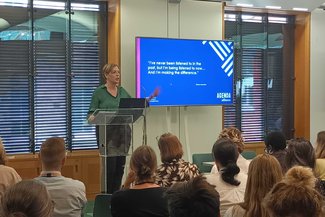
Agenda Alliance responds to the King's Speech
We voice our concern regarding the lack of urgently needed reform to the Mental Health Act.

23 Jul 2024
We cautiously welcome some of the developments announced in the King’s Speech, and reiterate the need for further planning around these bills to include gender-responsive approaches for women and girls experiencing multiple unmet needs.
Read our full response below:
On 17 July 2024, the King’s Speech set out clearly the priorities of the new Labour government, elected on 5 July 2024. Women and girls experiencing multiple unmet need have been at the sharpest edge of decades of austerity, and this speech was an opportunity to provide clarity in some of the policy spaces where the biggest difference can be made to their lives. While we welcome many of the commitments made, we need additional information from the government as to how these policy changes will be enacted with women and girls in mind, to ensure gendered disadvantage is addressed effectively.
We welcome the commitment to modernise the Mental Health Act so that it is fit for purpose. This legislation is outdated and discriminatory, disproportionately impacting Black people and denying people dignity and choices around their mental health. We hope that the Mental Health Bill promised in the King’s Speech will address the specific gendered drivers of poor mental health among women and girls, such as domestic abuse and the cost of living crisis, to ensure women and girls in touch with mental health services can access the care they deserve.
We were also encouraged by the announcement that metro mayors and combined authorities will receive additional powers through the English Devolution Bill. Public services are currently unable to respond to local need effectively, and we are committed to working closely with policymakers to ensure the most marginalised women and girls – regardless of their postcode – can access gender-responsive, holistic and wraparound support.
Nonetheless, many of the announcements in this speech are a cause for concern until further clarity is provided, and we would welcome the opportunity to speak with policymakers to explore how broader legislative goals can be fit for purpose for women and girls experiencing multiple unmet need. We are concerned that the Crime and Policing Bill commits to giving the police greater power to deal with antisocial behaviour, but does not clarify how the root causes of antisocial behaviours for which women and girls are criminalised will be addressed (for example, having no safe place to call home; using substances to cope; and a lack of support for mental health needs).
Furthermore, while we support the government’s commitment to promote children’s wellbeing and improve standards in schools, we would like to work closely with policymakers to ensure that introducing measures such as identification numbers across public services do not result in covert monitoring of children and young people. Finally, while the commitment to the Draft Equality Bill to ensure equal pay is critical, we hope that the government will not miss the opportunity to address the wider and systemic racism Black, Asian, Minoritised and Migratised women face in society beyond issues of pay.
The Government have a number of significant issues to address and we look forward to working closely with them to ensure the interconnected needs of women experiencing multiple disadvantage are not overlooked in the interests of delivering policy change at pace. Women and girls need long-term and committed investment to address the crisis in public services, and while this King’s Speech provides an indication that the new Government will work to address these problems, we look forward to receiving further clarity about how public services will be truly reformed to deliver gender-, age-, trauma- and culturally-responsive support to all those who need it.

We voice our concern regarding the lack of urgently needed reform to the Mental Health Act.

Agenda responds to the Care Quality Commission’s report highlighting an increase in detentions under the Mental Health Act.

As we approach the close of the year, our Policy and Public Affairs Officer Tara reflects on our work to influence government in 2023.